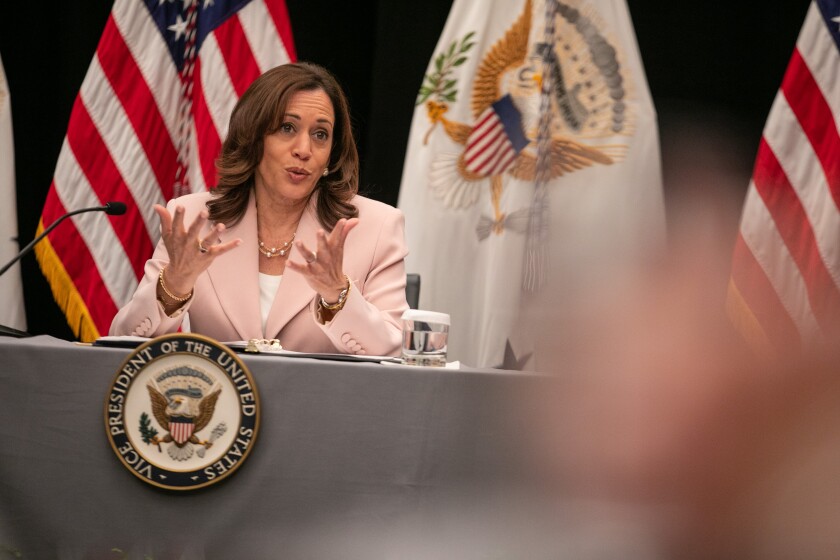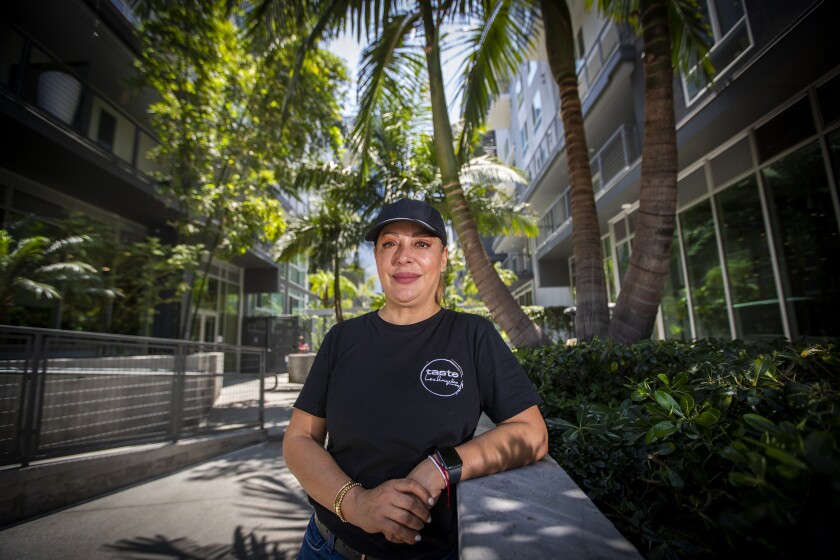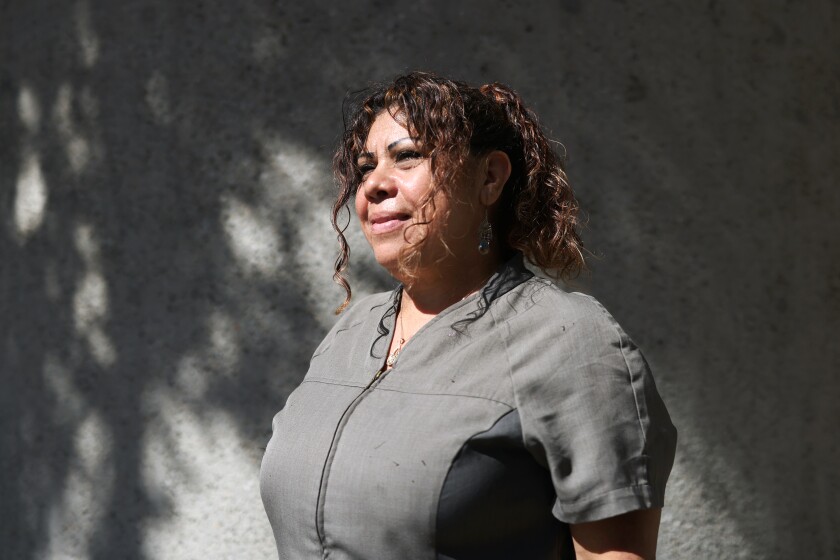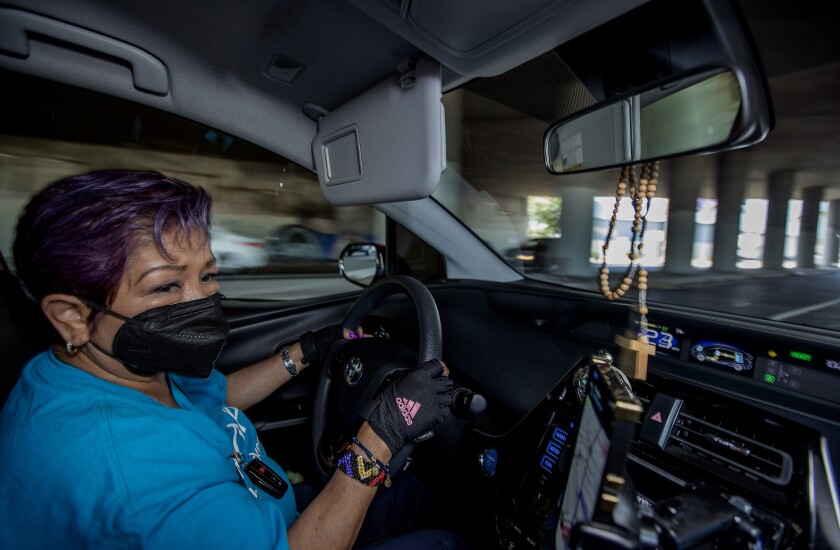[ad_1]
When Ana Diaz, a Salvadoran immigrant who lives in Van Nuys, uncovered out she would be mixing cocktails for earth leaders at the ninth Summit of the Americas in Los Angeles, she got fired up.
“I could in all probability serve Mrs. Kamala Harris or Mr. Biden,” the 48-year-outdated explained she thought to herself.
Diaz is scheduled to do the job as 1 of the bartenders at the closing ceremony Friday evening at the Los Angeles Convention Middle — the nerve centre of the summit, which delivers alongside one another political leaders, civil society businesses and enterprise executives from North, South and Central The united states and the Caribbean.
Diaz believes that some “good change” could come from the leaders chatting about important challenges, specially immigration — a cornerstone of the summit. Diaz just wishes she had extra of a say.

(Jason Armond / Los Angeles Times)
“I feel there ought to be a seat for people like me, an immigrant,” she explained.
This week, domestic and foreign dignitaries from across the Western Hemisphere are delivering speeches and brainstorming significant strategies guiding shut doors under large safety, though Latin American immigrants, and their U.S.-born small children, sort the infrastructure that keeps the convention humming.
The Latin American diaspora — 1 of the largest immigrant populations in the U.S., with arguably the biggest stake in the summit’s benefits — was on the periphery.
These immigrants served espresso and bused tables at the luncheons and dinners. They created beds and vacuumed resort rooms the place a lot of summit attendees expended the night. They shuttled attendees to events scattered during downtown.

Ecuadoran President Guillermo Lasso comes at an celebration at the Summit of the Americas.
(Chandan Khanna/AFP, via Getty Photos)
Although they were being grateful for the work, several didn’t pretty know what the summit was all about. Some felt privileged to be in the space with influential individuals. A handful of hoped the summit would outcome in some thing favourable for them or spouse and children and mates residing in Latin The us.
Other individuals didn’t assume the summit was consequential to their life, and thought it was more talk than action. But almost all of them felt that they must have more of a voice at the summit.
“You will need to speak with the common men and women in these international locations and inquire what they actually require,” Diaz explained she would tell summit leaders if specified an opportunity.
On Tuesday, Teresa Trejo, a 48-yr-old who lives in Inglewood, spent most of her day setting up and decorating the concession stands at the Conference Heart. She is scheduled to whip up lattes, cappuccinos and other specialty espresso beverages at the summit.

Teresa Trejo, who is initially from Mexico, is a barista at the conference center for the Summit of the Americas in downtown Los Angeles.
(Allen J. Schaben/Los Angeles Moments)
“I see functioning this summit as a privilege,” reported Trejo who was born in the U.S. but grew up in Mazatlán, Mexico. Even though she earlier hadn’t identified a great deal about the summit, she was excited to find out its great importance when she uncovered out about it a handful of months in the past.
At 4 a.m. Monday, Blanca Alas, a 59-calendar year-outdated immigrant from Guatemala, still left her Lancaster dwelling for her early early morning housekeeping shift at the InterContinental Downtown Los Angeles, which is web hosting a lot of of the summit’s foreign leaders.
Alas generally gets home at 7 p.m. She eats, sleeps and does the exact the following workday. She does not have substantially time for the information. She didn’t really know much about the summit until her workmates told her about it. She was upset that Guatemalan President Alejandro Giammattei wouldn’t go to and discuss with U.S. leaders.
“So lots of of our persons have still left these nations around the world out of requirement … simply because they have to. These countries have lots of complications,” Alas explained. “These leaders must at minimum display up to talk with each and every other about it.”

Maria Mejia, 55, outside the house the Westin Bonaventure Resort and Suites the place she works in downtown Los Angeles.
(Dania Maxwell / Los Angeles Instances)
On the 19th flooring of the Westin Bonaventure Resort & Suites, Maria Mejia of El Salvador pushed a cart stacked with cleansing materials, towels and mini soaps. By 8 a.m. she’d began her shift as a housekeeper. Close by, attendees in dapper fits walked briskly to get the closest elevator to the foyer floor.
Mejia, 55, said she’d heard one thing about the summit at get the job done after administrators suggested her to depart house early because site visitors would most likely be a lot more congested than regular.
Just outside the Westin, and in the employees’ cafeteria, Mejia and her co-employees — a lot of of them immigrants from Mexico and Central and South The us — were being abuzz about which leaders weren’t coming and which had boycotted the summit.
A Mexican housekeeper shook her head when she found out Mexican President Andrés Manuel López Obrador had declined to attend, in protest against the Biden administration’s selection to exclude the autocratic leftist leaders of Cuba, Venezuela and Nicaragua from the summit.
Mejia was dissatisfied that Salvadoran President Nayib Bukele wasn’t coming. She’s a supporter of the former mayor and businessman, and considers him to be “her president.” She feels the very same about President Biden and is stoked to engage in a little portion in what she described as an “important event.”
Mejia, who fled El Salvador in the course of its civil war in the 1980s, mentioned she’s joyful with her existence right here but hopes that she can achieve lawful residency someday shortly. She was ready to help save up to purchase a house in Huntington Park and stated she’s optimistic about the foreseeable future and what may perhaps come of the summit. For now, she has only short-term secured status, which lets her to do the job legally in the U.S. and shields her from deportation but must be renewed every single several months.
“I would question the U.S. leaders to move some kind of immigration reform and for the Latin American leaders to push them and support them on that,” Mejia reported.

Reyna Hernandez, a Mexican immigrant who drives for Uber and Lyft, drives a buyer to their spot. Hernandez has followed the Summit of the Americas for a long time and thinks leaders just do talking and don’t get enough action.
(Mel Melcon/Los Angeles Instances)
Reyna Hernandez put in the first two days of the summit shuttling attendees about city. The 61-calendar year-outdated, who drives for Uber and Lyft, mentioned she has followed the occasion for decades.
She’s delighted for the do the job, but she thinks not significantly will consequence from all these conferences.
“They just meet inside four partitions and discuss among by themselves. Which is all,” reported Hernandez, an immigrant from Puebla, Mexico. “Yes, sure, they speak about crucial themes. They’ve completed that for yrs, but they really don’t appear up with serious remedies. I really don’t truly see these governments caring for their persons.”
Hernandez claimed she has read a thing about an immigration declaration but doesn’t imagine there will be a tangible good affect for immigrants like her. She rents a area in a residence in El Monte for $700 a thirty day pe
riod and has additional speedy demands. She’s much more anxious about soaring gasoline costs than immigration challenges.
“How am I heading to make the hire with fuel rates so higher?” she asked.
She scoffed at the concept of the conference: “Building a Sustainable, Resilient, and Equitable Foreseeable future.”
Hernandez left Puebla for Los Angeles in 1995 when she turned a one mother to 5 young children just after her spouse died. She assumed she’d discover a far better everyday living, and, in some approaches, she did. But immediately after several years of toiling away in low-paying out work opportunities as a nanny, housekeeper and now driver, she no lengthier believes in the American dream.
“I feel it’s a lie. To be capable to do this … to develop a sustainable foreseeable future, we’d all have to be used with the chance of good wages that permit us to live with dignity. With great healthcare so we really don’t have to rush to the unexpected emergency rooms for illness.
“That’s not heading to materialize,” she reported.

Law enforcement officers patrol in preparing for the Summit of the Americas at the L.A. Convention Center.
(Marcio Jose Sanchez / Associated Press)
[ad_2]
Source link